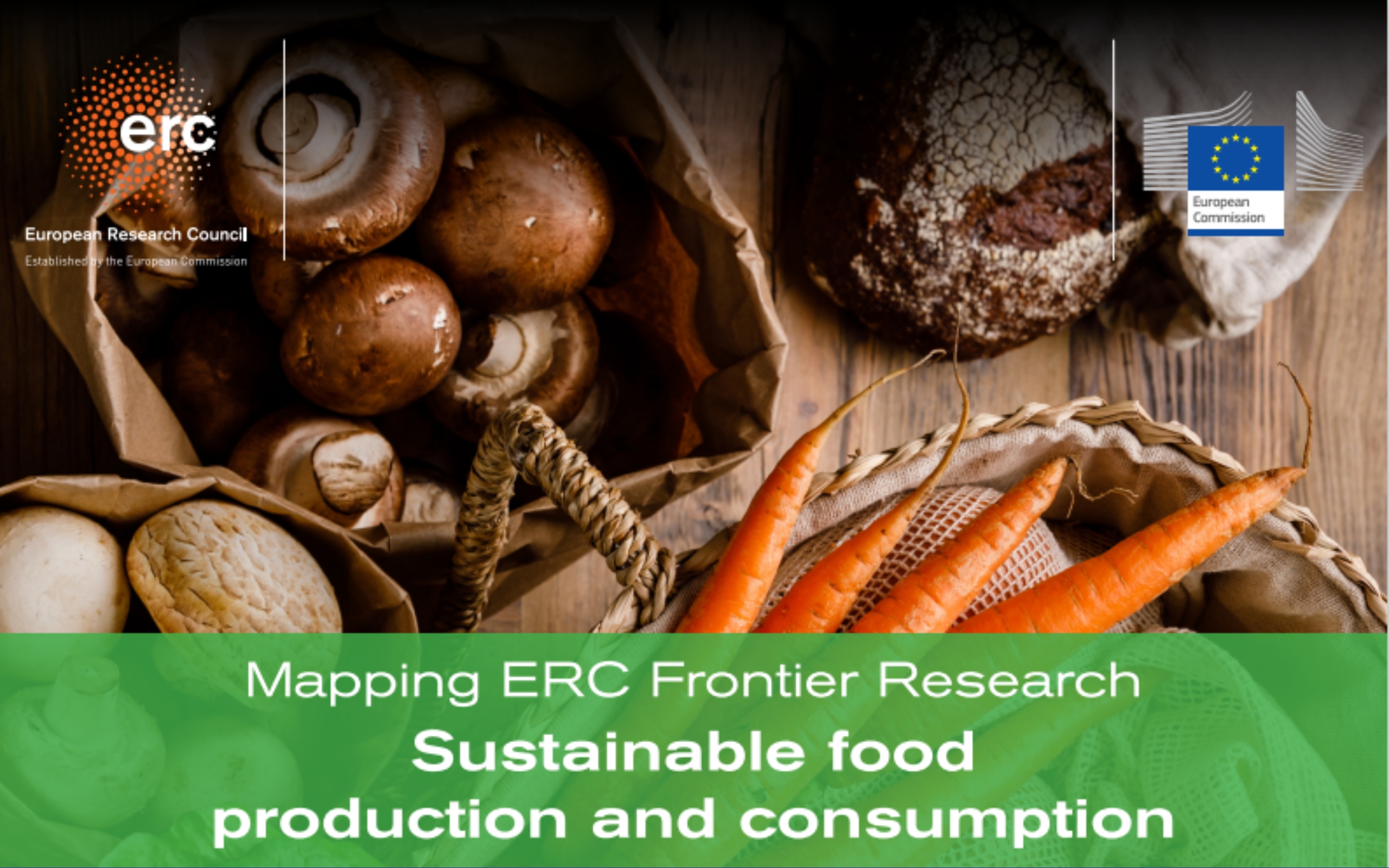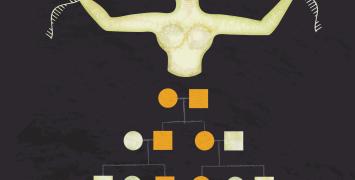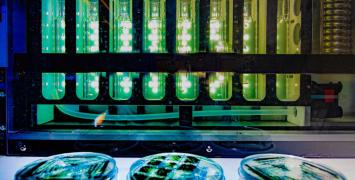Promoting sustainable food production and consumption is a critical challenge that is closely intertwined with our health and the well-being of our planet. This report offers an analysis of the portfolio of projects funded by the ERC that are relevant to the EU's research and innovation Food 2030 policy. The primary goal of this policy is to transform food systems and ensure that everyone has access to sufficient, affordable, and nutritious food, enabling them to lead healthy lives.
Watching this video you are accepting Youtube cookies policy
The report highlights 102 ERC-funded projects, with a combined funding of 228 million euros, spanning the periods of FP7 (2007-2013) and H2020 Framework Programme for Research (2014-2020), and is the result of a collaboration with the European Commission’s Scientific Advice Mechanism (SAM). On 28 June 2023, the SAM published a Scientific Opinion containing a set of recommendations for a combination of policy interventions aimed at overcoming barriers that hinder consumers from adopting healthier and more sustainable eating habits.
The report underscores the significant role of ERC-funded research in addressing the multifaceted challenges related to food production and consumption, including vital aspects like waste management. It illustrates how this research actively contributes to the advancement of sustainable food systems, bolstering their resilience for the future.
Mapping ERC Frontier Research | Sustainable Food production and consumption

A selection of relevant ERC projects
The ten pathways represent crucial domains where research and innovation can significantly contribute to the advancement of sustainable food systems. The following section highlights ERC-funded projects that offer novel perspectives and innovative solutions to address these areas delineated within the Food 2030 policy.
Pathway 1: Governance and system change
Food systems engage actors from various sectors such as nutrition, health, environment, industry, business, and trade. These systems face challenges and have far-reaching effects on climate, health, and livelihoods. Relevant ERC projects look into supply chains and their impact on forest conservation and livelihoods; the emergence of new water justice movements with the potential to shape equitable and nature-based water governance; the effects of certification strategies, such as fairtrade, by testing the transformative potential of the concept of environmental justice; legal tools for scholars and stakeholders to manage competing interests in the offshore economic sector as well as how the interaction of little material-semiotic tools determines success or failures in the emerging bioeconomy. Other topics include climate change and conflict, equality and access to food and the link between food security and biodiversity.
Pathway 2: Urban food systems transformation
Challenges to urban food systems include food waste and greenhouse gas emissions associated with food. As urbanisation grows, the relationship between food, health and socio-economic inequalities in cities presents a significant challenge, with food access and hunger becoming an issue also in cities in high-income countries. While urban sites are contributing significantly to greenhouse gas emissions, they can at the same time implement green infrastructures for food production, promote air quality and temperature and reduce environmental impact.
Population growth and economic development have dramatically increased the demand for food and water, and urban groundwater use has risen exponentially to meet the ever-increasing population growth of mega-cities. Several ERC projects are addressing this challenge, for instance by focussing on drinking water infrastructure systems or on the global volume of physically and economically extractable fresh groundwater to provide new knowledge for sustainable groundwater use.
Pathway 3: Food from the ocean and freshwater resources
Europeans consume roughly twice as much seafood as they produce. Fisheries in the EU have faced collapses of major stocks due to overfishing and the general degradation of marine ecosystems. Many ERC projects work on how to improve the health of the ocean, and some directly focus on fisheries or aquaculture, which is foreseen to have the potential to be able to supply close to two thirds of global seafood consumption by 2030. Other projects address the topic of food security by looking at fish could provide a readily available and cheap source of micronutrients and protein.
Pathway 4: Alternative proteins and dietary shift
Diversifying diets can reduce greenhouse gas emissions from food production, tackle land use and biodiversity challenges, and provide sufficient, nutritious, safe, and affordable food for a growing population. ERC projects primarily focus on plant-based foods to address the challenge of finding food alternatives to meet the demands of a growing global population, taking up the topic of foraging as a basic economic strategy or the influence of forests on dietary quality in low-income countries.
Pathway 5: Food waste and resource efficiency
Food loss and waste intended for human consumption exacerbate food insecurity and impede nutrition. Several ERC-funded project have taken up this subject, for instance focusing on city-based food sharing economies and finding tangible solutions to reduce food waste. Regarding the latter, the PI and his team developed a smartphone app that can provide real-time information on the edibility and freshness of packaged food. The technology the app builds on can empower customers and improve the entire supply chain process. It has resulted in the start-up company, ColorSensing.
Pathway 6: The microbiome world
Microbiomes are communities of microorganisms that thrive in specific environments, including soils, oceans, and even within our bodies, plants, animals, and food. These microbiomes play a significant role in influencing our health, shaping the food we produce, and impacting ecosystems at large. Several ERC projects are dedicated to studying microbiomes and exploring the potential solutions they offer in terms of nutrition, health, and food safety. One notable example is the MetaPG project, which employed computational biology to bridge the gap between metagenomics and population genomics. Furthermore, the project Homo.symbiosus is opening a new era of individualised preventive care and novel gut ecology-based therapeutic approaches.
Pathway 7: Healthy, sustainable and personalised nutrition
Malnutrition, climate change, resource scarcity, a growing and ageing population, urbanization, and food poverty pose significant challenges to global and EU food systems. The transformation in food production, processing, and consumption has resulted in approximately 800 million undernourished individuals, 2 billion suffering from micronutrient deficiencies, and 2 billion affected by overweight or obesity. ERC projects are actively addressing these issues, considering various perspectives from the medical, clinical, public health, socio-economic, and behavioural domains. These projects focus on improving access to food, analysing the composition of diets, identifying harmful components, and devising strategies to promote healthier food choices for individuals and populations, ultimately leading to healthier lifestyles.
Pathway 8: Food safety systems of the future
Food safety plays a fundamental role in promoting good health and ensuring sustainable development. Despite significant advancements, concerns regarding food safety and traceability persist within the EU. The complex relationship between climate change and various food safety hazards has the potential to elevate the risk of foodborne illnesses and hinder access to safe and nutritious food for millions of individuals worldwide. Numerous ERC projects are dedicated to studying plant health and foodborne diseases. In the fields of physical science and engineering, researchers are also exploring innovative approaches to labeling food products, enhancing traceability, and bolstering overall food safety measures.
Pathway 9: Food systems in Africa
With the world's fastest-growing population, Africa is expected to nearly double its population by 2050. Consequently, the food market in Africa is experiencing rapid expansion, driven by urbanization, rising incomes, and the emergence of a growing middle class. However, despite these advancements, malnourishment persists as a significant challenge in various forms. ERC-funded research is looking at how to improve farmers’ access to local and global markets, the interactive roles of forest patches in the agricultural landscapes and the role of animals for livelihoods.
Pathway 10: Food systems and data
Data-driven innovation is reshaping the way we produce, consume, and share food and how it is researched, and there is a sharp increase in the number of smart connected objects. Many of these innovations can contribute to policy ambitions like the EU Green Deal, the Farm to Fork strategy or the common agricultural policy and have the potential to advance the concept of ‘food citizenship’.




